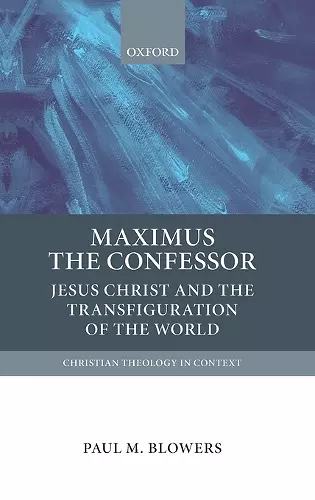Maximus the Confessor
Jesus Christ and the Transfiguration of the World
Format:Hardback
Publisher:Oxford University Press
Published:4th Feb '16
Currently unavailable, and unfortunately no date known when it will be back
This hardback is available in another edition too:
- Paperback£42.99(9780199673957)

This study contextualizes the achievement of a strategically crucial figure in Byzantium's turbulent seventh century, the monk and theologian Maximus the Confessor (580-662). Building on newer biographical research and a growing international body of scholarship, as well as on fresh examination of his diverse literary corpus, Paul Blowers develops a profile integrating the two principal initiatives of Maximus's career: first, his reinterpretation of the christocentric economy of creation and salvation as a framework for expounding the spiritual and ascetical life of monastic and non-monastic Christians; and second, his intensifying public involvement in the last phase of the ancient christological debates, the monothelete controversy, wherein Maximus helped lead an East-West coalition against Byzantine imperial attempts doctrinally to limit Jesus Christ to a single (divine) activity and will devoid of properly human volition. Blowers identifies what he terms Maximus's "cosmo-politeian" worldview, a contemplative and ascetical vision of the participation of all created beings in the novel politeia, or reordered existence, inaugurated by Christ's "new theandric energy". Maximus ultimately insinuated his teaching on the christoformity and cruciformity of the human vocation with his rigorous explication of the precise constitution of Christ's own composite person. In outlining this cosmo-politeian theory, Blowers additionally sets forth a "theo-dramatic" reading of Maximus, inspired by Hans Urs von Balthasar, which depicts the motion of creation and history according to the christocentric "plot" or interplay of divine and creaturely freedoms. Blowers also amplifies how Maximus's cumulative achievement challenged imperial ideology in the seventh century--the repercussions of which cost him his life-and how it generated multiple recontextualizations in the later history of theology.
Transfiguration of the World, published in Oxford University Press on 2016, is not only an useful tool for the monastic space, where the mystical aspect and the doctrinaire one are very important (and they are very well presented inside his approach), but also for the theologians from the academic space, philosophers and historians who want to find more about the presented topic or to go deeper in the complex history of Byzantine space of the 7th century. * Iuliu-Marius Morariu, Studia Monastica *
this book offers not only a splendid overview of Maximus in context and Maximus studies in general, but also offers up a wonderfully fresh re-reading and re-telling of Maximus by a seasoned master. * Marcus Plested, Journal of Ecclesiastical History *
The body of the book has many virtues. Blowers offers exhaustive discussions of textbook themes Maximus' view of the world; creation; salvation; the work of Christ; the church; human nature some of which come from formerly unreached places of understanding. * Luke Steven, Scottish Journal of Theology *
Blowers' portrait is a corrective to modern accounts that neglect the influence of his monastic theological milieu and their sources. While no stranger to protoscholastic precision and at times clearly possessing the grand vision of an Aquinas, Maximus is first and foremost a monk on a quest to align his will with the ground of his being and all being, namely the Logos. This shift in focus for understanding Maximus' spiritual pedagogy is the primary contribution of the monograph. Its impact is therefore primarily on modern appropriations of historical theology, but it is also an outstanding guide for introducing Maximus in pedagogical settings. * Samuel Pomeroy, Modern Theology *
ISBN: 9780199673940
Dimensions: 223mm x 153mm x 26mm
Weight: 568g
384 pages